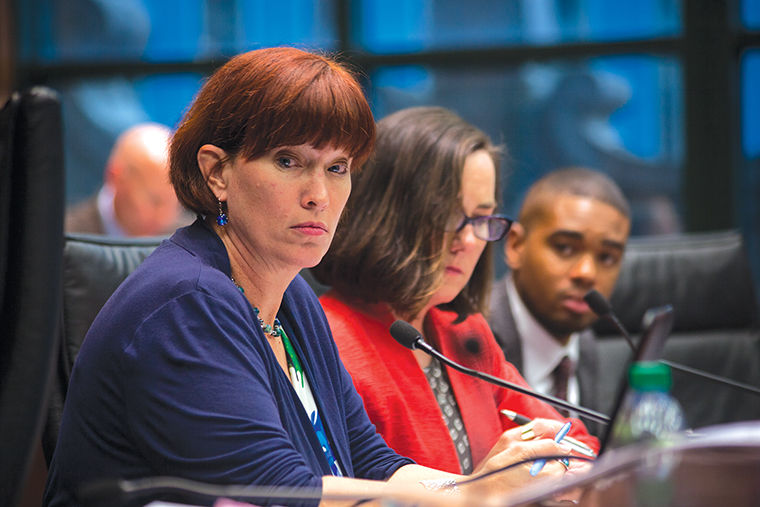Illinois lawmakers say recreational weed could fix state budget
State Sen. Heather Steans (left) and State Rep. Kelly Cassidy (right) authored legislation that would legalize recreational marijuana in Illinois.
April 24, 2017
With no solution in sight for the state’s budget crisis, some Illinois lawmakers are advocating for regulating and taxing recreational marijuana to help fund devastated state-funded programs, including public schools.
The first hearing on what State Rep. Kelly Cassidy, D-Chicago, said would be a lengthy series of in-depth discussions on the proposed policy’s impact was held April 19 at the Michael Bilandic Building, 160 N. LaSalle St.
Cassidy and State Sen. Heather Steans, D-Chicago, authors of legislation that would legalize marijuana for recreational use, invited Barbara Brohl, executive director of the Colorado Department of Revenue. Brohl oversees the state’s marijuana enforcement and explained the pros and cons of Colorado’s recreational marijuana law to the group of lawmakers.
“Prohibition right now just does not work,” Steans said. “We want to look and understand what is happening around the country on taxing and regulating [marijuana], and if there are other ways to be thinking about this.”
According to a March 11 Paul Simon Public Policy Institute poll, 74 percent of 1,000 Illinois residents surveyed support the decriminalization of marijuana for individuals in possession of small amounts for personal consumption. Sixty-six percent support recreational marijuana legalization if it is taxed and regulated like alcohol.
Steans said Illinois has approximately 700,000 residents who use marijuana, but only 17,000 have medical marijuana cards—meaning the majority acquires marijuana illegally. Senate Bill 316 and House Bill 2353 set up a framework to tax and regulate marijuana for recreational use in Illinois.
It is a major policy shift, and the bills are not intended to be called for votes during this session, she added.
According to Brohl, Colorado has used tax revenue from regulation to fund initiatives that Illinois needs to finance.
“Taxation is a key component because good regulation costs money,” Brohl said. “It takes longer, costs more and [is] harder than you think. What taxation money does is [fund] programs for substance abuse prevention and treatment.”
Colorado is able to receive these funds through a three-tier taxation system for recreational marijuana, she said. There is a 15 percent excise tax on the initial transfer of marijuana when it is first harvested. The first $40 million in revenue goes to school construction with the remainder added to public school system funding. A 10 percent special tax is also charged with 85 percent retained by the state to fund drug prevention and educational programs. A 2.9 percent state sales tax is then added.
She added that Colorado has collected $401.9 million in marijuana tax revenue since January 2014.
If the state adopts a similar system of marijuana sales, individuals will be able to own up to six plants per adult but will be subject to a criminal background check, Brohl said.
She added that states must be wary of improper use of marijuana after it is legalized.
“What keeps me up at night is a 22-year-old person who walks in and buys [marijuana] legally and gives it to his or her 15-year-old brother and sister,” Brohl said.
One difficulty with regulating recreational marijuana is the need for a scientifically accepted standard of an individual’s level of THC—the active ingredient found in marijuana—similar to the system used to measure blood alcohol level, Brohl said.
“We’re trying to figure out what’s the right way to approach this,” Brohl said.“It’s one of the difficulties of [marijuana regulation].”








